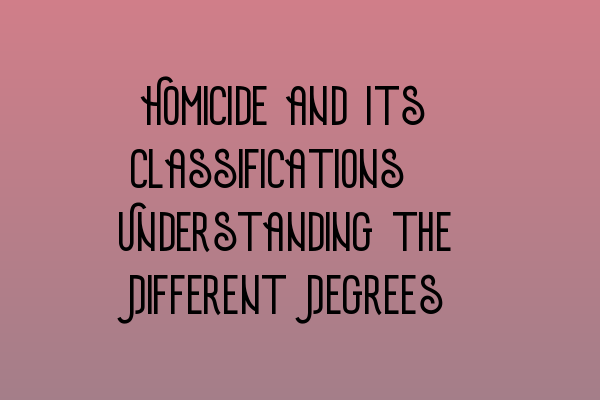Homicide and Its Classifications: Understanding the Different Degrees
At SQE Criminal Law & Practice Law UK, we understand the importance of comprehensively understanding homicide and its various degrees. Homicide is a serious offense that involves the unlawful killing of another person. In this blog post, we will delve into the topic of homicide and provide an in-depth understanding of its classifications.
What is Homicide?
Homicide is the act of unlawfully causing the death of another person. It is a broad term that encompasses various degrees of severity, ranging from intentional killings to accidental deaths. The classification of homicide depends on the mental state, intent, and circumstances surrounding the act.
Classifications of Homicide
1. Murder
Murder is the most serious form of homicide and is characterized by the intentional killing of another person with malice aforethought. Malice aforethought refers to the intent to cause death or serious bodily harm. Murder can be further classified into different degrees, depending on the specific jurisdiction.
In the United Kingdom, murder is classified into two degrees:
- First-Degree Murder: This involves the deliberate and premeditated killing of another person. It is commonly regarded as the most severe form of murder and carries severe penalties.
- Second-Degree Murder: This involves an intentional killing without premeditation or deliberation. It is often considered a lesser degree of murder but still carries significant legal consequences.
2. Manslaughter
Manslaughter refers to the unlawful killing of another person without malice aforethought. Unlike murder, manslaughter does not involve the element of premeditation or intent to cause harm. Instead, it is often the result of recklessness, negligence, or heat of passion.
Manslaughter can be further categorized into two types:
- Voluntary Manslaughter: This occurs when the offender is provoked and kills another person in the heat of passion. It is often considered a crime of passion and can carry lesser penalties compared to murder.
- Involuntary Manslaughter: This occurs when the offender unintentionally causes the death of another person due to gross negligence or reckless behavior. It does not involve the element of intent and is usually considered a less severe offense.
Understanding the Differences
It is crucial to understand the differences between the various degrees of homicide as they have significant implications on legal proceedings and potential penalties. Murder, with its various degrees, is generally considered a more severe offense than manslaughter.
If you are interested in learning more about SQE Criminal Law & Practice in the UK, we offer SQE 1 and SQE 2 preparation courses to help you excel in your legal career. We also provide SQE 1 practice exams and mocks to enhance your understanding and test your knowledge.
To stay updated on SRA SQE exam dates and other relevant information, make sure to check out our article on SRA SQE Exam Dates. It will provide you with valuable insights into upcoming examination schedules.
We hope this blog post has provided you with a comprehensive understanding of homicide and its classifications. If you have any questions or require legal assistance, please do not hesitate to contact SQE Criminal Law & Practice Law UK.
